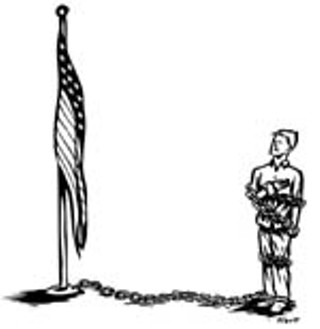Letters at 3AM
It's the Bill of Rights, stupid
By Michael Ventura, Fri., Jan. 23, 2004

In the final Democratic debate before the Iowa caucuses, the presidential candidates neglected to emphasize the most critical issue of the 2004 presidential election: the defense and full reinstatement of the Bill of Rights. Most Americans are unaware that we do not have the same Bill of Rights that we had four years ago. Its words haven't changed, but George W. Bush has drastically altered the laws that implement it. The result is the same: Our liberty is in serious danger.
In October 2001, shortly after 9/11, the USA PATRIOT Act passed the House by a vote of 356 to 66; in the Senate, the vote was 98 to 1 -- only Russ Feingold, D-Wis., dissented. The bill was composed by John Ashcroft's Justice Department in secret. Proper congressional hearings weren't held; virtually no questions were asked. The bill was pushed through a servile Congress so fast that many who voted for it have since admitted they didn't have time to read it.
The USA PATRIOT Act allows agents to enter your home in secret, by forced entry, without "probable cause" and without presenting a search warrant; they can then examine any property they think pertinent to their investigation, and they can secretly attach to your computer a device known as the Magic Lantern, which records every keystroke. They may re-enter your apartment at intervals, again secretly, and use the Magic Lantern to download all your computer activity. They are supposed to notify you of their activity in 90 days, but there are loopholes that for practical purposes can delay notification indefinitely. Remarkably, this law does not apply only to cases related to terrorism; it applies to all criminal investigations.
The Fourth Amendment of the Bill of Rights reads: "The right of the people to be secure in their persons, houses, papers, and effects, against unreasonable searches and seizures, shall not be violated, and no Warrants shall issue, but upon probable cause, supported by oath or affirmation, and particularly describing the place to be searched, and the persons or things to be seized." That is no longer in force. Probable cause, the presentation of warrants, and the specification of what is being searched for no longer hold. And it can't be emphasized enough that this revision of the Fourth Amendment applies not only to terrorism investigations but to all criminal investigations.
The bill allows the FBI to demand from libraries and bookstores lists of books borrowed or bought by persons under investigation, and it prohibits librarians and bookstore owners from letting anyone, including the press, know of the search. As Nat Hentoff writes in his informative book The War on the Bill of Rights, this is "a gag rule unprecedented in American history." Before, the PATRIOT Act wiretaps were granted for a single phone, for probable cause; but this bill provides for "roving wiretaps," issued on the grounds of mere suspicion. As Hentoff writes: "If a suspect uses a relative's phone or your phone, that owner becomes part of the investigative database. So does anyone using the same pay phone or any pay phone in the area." This means you are now part of the investigation, and you too can be investigated. The person who used your phone needn't have done anything. No probable cause. None for you either.
According to the USA PATRIOT Act, a person may be accused of terrorism if they attempt to "influence the policy of a government by intimidation or coercion" -- which could mean activities like organizing and attending demonstrations, setting up a Web page, writing an article, or whatever Bush/Ashcroft define as "intimidation." How loose are their standards? The passage of the USA PATRIOT Act emboldened Attorney General John Ashcroft to re-write the FBI's guidelines for investigation. In part those guidelines read, as quoted by Hentoff:
"The nature of the conduct engaged in by a [terrorist] enterprise will justify an inference that the standard [for opening a criminal intelligence investigation] is satisfied, even if there are no known statements by participants that advocate or indicate planning for violence or other prohibited acts. ... [A] combination of statements and activities may justify a determination that the threshold standard for a terrorism investigation is satisfied even if the statement alone or the activities alone would not warrant such a determination." [My italics.]
Read that twice. It means you don't have to do or say anything specific or damnable to be investigated. Ashcroft's people can investigate you for any reason they please.
There is more, much more (such as the indefinite detention of two American citizens without charges, trial, or access to family and lawyers); I haven't space to cite it all. The great issue is: This is what the Bush administration has already done, even when facing re-election. What will Bush do if given another term, a mandate of power during which he is not restrained by re-election pressures? The hints are in Ashcroft's proposed Patriot II.
For months the Ashcroft Justice Department denied to Congress that it was composing another bill; then a true patriot, still unknown, leaked the proposed bill that Ashcroft had been lying about. It includes a new version of the infamous Operation TIPS, in which Americans inform on one another; and, most ominously, it provides for stripping Americans of their citizenship for the same vague, arbitrary reasons as in Ashcroft's FBI guidelines. For the first time in our history, it would be possible for the government to simply declare you a noncitizen, instantly stripping you of all your rights under the Constitution. In addition, Ashcroft has proposed building "detention camps" for such noncitizens. Camps in which you'd have no rights whatsoever.
Again, there is much more; I haven't space to cite it. All I can do here is indicate the terrible danger, the enormous stakes. 2004 could be the most important election in our history.
These Democratic presidential candidates voted for the USA PATRIOT Act: Senators John Kerry, Joseph Lieberman, and John Edwards. So did Hillary Rodham Clinton, who is almost certain to run one day. I would like to be pure and say that this disqualifies them from getting my vote; Representative Richard Gephardt should also be disqualified for his statement that "we're in a new world where we have to rebalance security and freedom. We're not going to have the openness and freedom we have had." But facts are facts: The Bill of Rights, the most important single political document ever written, is at stake, and Democrats subvert it far less than Republicans (an issue both Ralph Nader and the Green Party do not address). So I would vote for any of those errant politicians -- Kerry, Lieberman, Edwards, Clinton -- over Bush.
Dennis Kucinich would be my kind of president, but he can't win -- and the Bill of Rights is at stake. He has served democracy both in the Congress and (by keeping the others more honest than they would have been) in the campaign. But the Bill of Rights is at stake, and he won't get the chance to protect it. Neither will Al Sharpton, who has also helped keep candidates honest.
Gen. Wesley Clark, who supported Nixon and Reagan, is viable, and he would not likely be bullied or fooled by the Pentagon (a major plus). Whether he'd stand for the Bill of Rights is unknown, but he'd get rid of Ashcroft, and Ashcroft is the pit bull in the attack on our freedoms.
Howard Dean has been crippled by the attack ads of Kerry, Lieberman, and Gephardt -- they all have, in effect, donated their negative ads to the Republican Party (Dean and Clark included). But Dean has guts and speaks his mind. It's doubtful that anyone who shoots his mouth off as much as Dean will subvert the Bill of Rights. Senator Tom Harkin (who, like Ted Kennedy and the late Paul Wellstone, also voted for the USA PATRIOT Act) was not far wrong calling Dean this era's Harry Truman. Dean will compromise, Dean will tap dance, but he's not likely to stomp on the Bill of Rights.
John Edwards is as inexperienced as John Kennedy. He, too, speaks his mind (he's the most articulate of the candidates), and his record indicates that he means what he says about working people. He, too, is an unlikely subverter -- in this time of peril, that's my only standard.
Because as long as the Bill of Rights is intact it's possible to address everything else. Without it, we have no chance.
Hentoff quotes Justice William O. Douglas, words we can't afford to forget: "As nightfall does not come at once, neither does oppression. In both instances, there is a twilight when everything remains seemingly unchanged. And it is in such twilight that we all must be most aware of change in the air -- however slight -- lest we become unwitting victims of the darkness." ![]()










